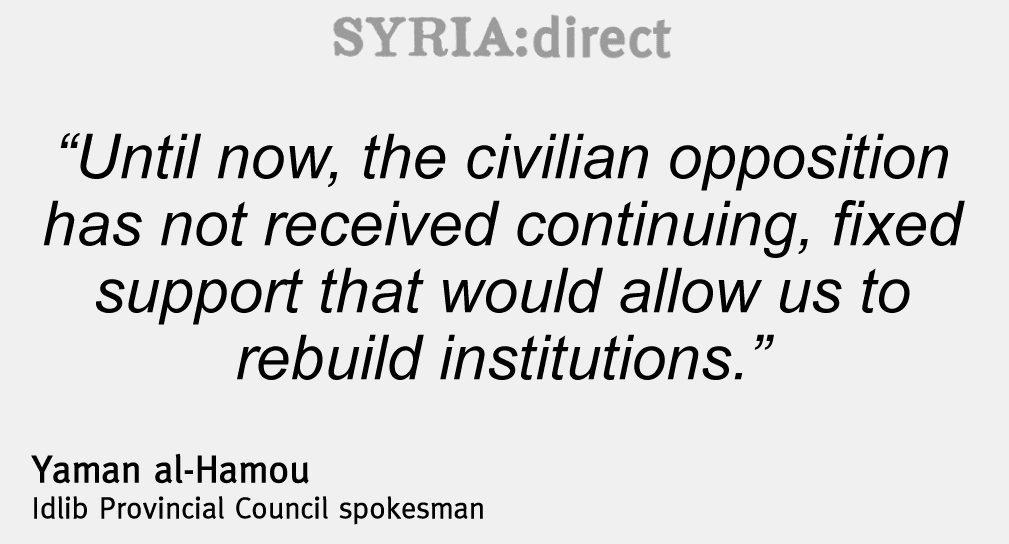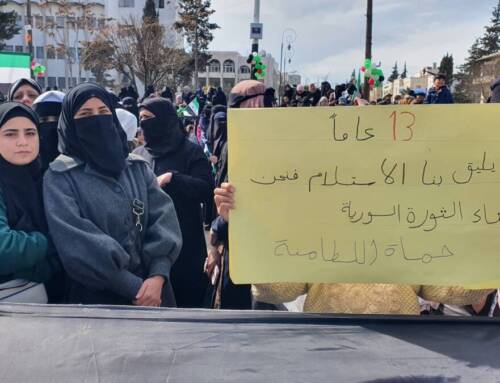Idlib provincial spokesman says ‘all institutions’ under civilian rule
After a coalition of Islamist brigades known as the Victory […]
30 March 2016
After a coalition of Islamist brigades known as the Victory Army captured most of Idlib in the spring of 2015, it announced that the province would be ruled by civilian officials.
One year later, the spokesman of the civilian Idlib Provincial Council says that all of the province’s institutions, “including education, health, hospitals, and courts are under entirely civilian administration,” Yaman al-Hamou tells Syria Direct’s Noura Hourani.
The Idlib Provincial Council is independent of the Victory Army. It is responsible for providing civil services in the northwest province, including food subsidies and medical care. Most of its funding comes from the opposition Transitional Government.
But the Provincial Council, made up of members elected by smaller, local councils, has not always provided services to the satisfaction of residents. Earlier this month, Saraqib residents organized protests over the high cost of basic goods such as bread and electricity.
The spokesman points to unstable funding as an obstacle in providing services.
“Until now, the civilian opposition has not received continuing, fixed support that would allow us to rebuild institutions and enable the internal, civilian opposition to effectively govern.”
Q: A year has passed since opposition forces captured Idlib province. How would you rate the provincial administration’s performance under opposition control?
A year after the liberation of Idlib province we’ve started to see, day after day, that the opposition has proven its success in civilian administration, despite difficulties and challenges in light of the circumstances the province is facing, including regime and Russian bombings.
Q: Is the council truly civilian in nature?
We worked to find representatives from different areas who were elected by local councils. The provincial council, which runs an entirely civilian administration, was formed by that method. All of the province’s institutions, including education, health, hospitals and courts are under entirely civilian administration.
Q: What guarantees the rule of law?
There are Sharia courts—they guarantee the rule of law.
Q: To what extent do these courts possess executive power, especially seeing as opposition brigades have their own courts?
The courts are powerful. All of the brigades agreed on the Sharia court judges, seeing as they’re local. As for the brigades’ courts, they are specialized in adjudicating matters related to soldiers, and do not conflict with the Sharia courts.
Q: What types of difficulties do you face in administering the province?
To be honest, we don’t deny that there are difficulties and obstacles, such as the lack of open support for the opposition by the international community, which would enable it to complete its projects.
The most important obstacle is Assad’s methodical targeting of schools, hospitals, and all other signs of life in the province, which prevents progress and uses up resources.
Q: What do you mean by “open support?”
Until now, the civilian opposition has not received continuing, fixed support that would allow us to rebuild institutions and enable the internal, civilian opposition to effectively govern.
Q: A while ago Saraqib residents protested against the local council because of high prices—what’s your stance on the matter?
As the Idlib Provincial Council, we work with our partners to create projects that aim to sustain low prices in light of the Syrian pound’s massive decline, which greatly effects people. For example, we subsidize bread, and soon a flour-subsidy project will be suggested, in cooperation with the ACU [the Assistance Coordination Unit, founded by the SNC and responsible for coordinating the delivery of humanitarian aid primarily to opposition-held areas].







